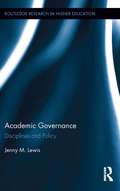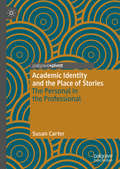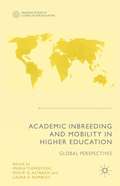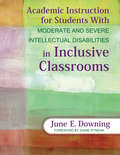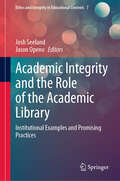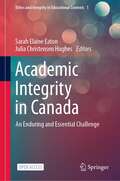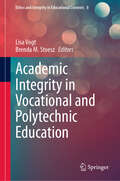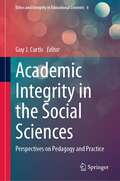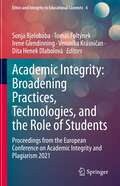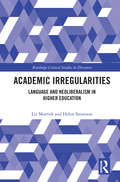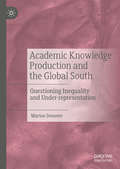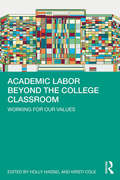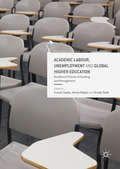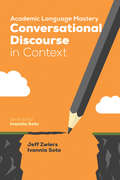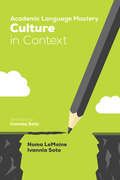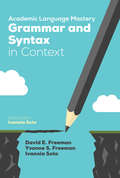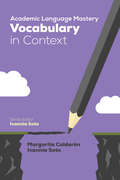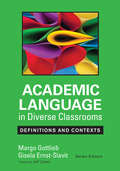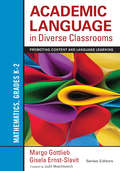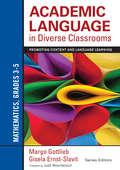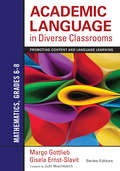- Table View
- List View
Academic Governance: Disciplines and Policy (Routledge Research in Higher Education)
by Jenny LewisAcademia is an important site for producing knowledge, which is crucial in driving economies and societies around the globe at the beginning of the 21st century. Yet surprisingly little is known about how contemporary universities are shaped by the formal and multiple demands they face from national policy requirements, particularly performance measurement. What effects do these policies have on individual universities and the academics who work within them? While policy surely has impacts on institutions and academics, there are also numerous other things that shape academic life. This book’s starting point is that there are three main shaping forces that govern academia – intellectual curiosity, disciplinary traditions and research policy. Bringing these three levels together into a framework, this book examines how academia is governed, both formally and informally, bridging the different aspects of governing knowledge networks through a large multi-country study. Author Jenny Lewis uses a large empirical study of academics in three countries (Australia, Britain and New Zealand) and in the broad disciplinary areas of the humanities, social sciences and sciences, to demonstrate the analytical framework’s application. The book also offers some needed directions on what policy should and can do, providing a snapshot of contemporary academic life in different disciplines and in different countries, from the perspective of academics on the frontline.
Academic Identity and the Place of Stories: The Personal in the Professional
by Susan CarterThis book explores academic identity development in the 21st century university. Recognising dramatic shifts in academic practices and landscapes, the book pushes back on rising neoliberalism with a person-focused, culturally aware pathway for career development. Stories of the author’s own experiences intersect a solid grounding in educational literature, encouraging scholars to take an active role in considering their own academic identity. In doing so, this volume suggests that academics look inward at what matters to them – rather than being overwhelmed by academia – in order to shape identities and career trajectories that are dynamic and satisfying.
Academic Inbreeding and Mobility in Higher
by Philip G. Altbach Maria Yudkevich Laura E. RumbleyAcademic inbreeding - appointing one's own graduates for academic positions - is a controversial but surprisingly common practice internationally. This book is the first comparative analysis of the phenomenon - the causes, implications, and future of inbreeding.
Academic Instruction for Students With Moderate and Severe Intellectual Disabilities in Inclusive Classrooms
by June E. DowningA useful resource for all educational teams who plan for students with moderate and severe intellectual disabilities. In each chapter Downing summarizes current, key research and offers practical applications from her wealth of experience in schools. Readers who are new to planning for students with severe disabilities will find excellent coverage of the basics like systematic instruction, positive behavior support, and collaboration. Professionals with extensive experience will benefit from the new ideas for planning, including specific examples of adapting academic content, considering both family goals and state standards in planning, and using universal design for learning.
Academic Integrity and the Role of the Academic Library: Institutional Examples and Promising Practices (Ethics and Integrity in Educational Contexts #7)
by Jason Openo Josh SeelandThis book presents the growing interconnection of two pillars from the world’s higher education institutions: academic integrity and libraries. It provides sound examples to extant questions and conversations about whose job it is to teach academic integrity, and what library work is. The role of libraries in supporting academic integrity is not always clear and has not been fully explored. Drawing from library literature and that of academic integrity more broadly, readers are exposed to how libraries are necessary in a holistic approach to academic integrity. Education about academic integrity and the prevention of academic misconduct, for not only students but other institutional stakeholders, are demonstrated as occurring optimally in positive, supportive, and proactive ways. The book details numerous ways in which librarians can work with faculty and other stakeholders using established frameworks such as information literacy and blended librarianship as well as innovative platforms and content. Other contributions involve the identification of potential academic misconduct and administration of academic integrity policies to complete the cycle recommended by the frameworks of global educational quality organizations (QAA, TEQSA). Initiatives presented in the book include those at the course level and institution-wide initiatives involving curriculum, policy, and supports for faculty and students. Also contained are efforts occurring at a national level within professional networks , in addition to international library curriculum. This book provides inspiration to institutions and academic libraries of any size and scope to embrace this emerging role in creating cultures of academic integrity.
Academic Integrity in Canada: An Enduring and Essential Challenge (Ethics and Integrity in Educational Contexts #1)
by Sarah Elaine Eaton Julia Christensen HughesThis open access book presents original contributions and thought leadership on academic integrity from a variety of Canadian scholars. It showcases how our understanding and support for academic integrity have progressed, while pointing out areas urgently requiring more attention.Firmly grounded in the scholarly literature globally, it engages with the experience of local practicioners. It presents aspects of academic integrity that is specific to Canada, such as the existence of an "honour culture", rather than relying on an "honour code". It also includes Indigenous voices and perspectives that challenge traditional understandings of intellectual property, as well as new understandings that have arisen as a consequence of Covid-19 and the significant shift to online and remote learning.This book will be of interest to senior university and college administrators who are interested in ensuring the integrity of their institutions. It will also be of interest to those implementing university and college policy, as well as those who support students in their scholarly work.
Academic Integrity in Vocational and Polytechnic Education (Ethics and Integrity in Educational Contexts #8)
by Brenda M. Stoesz Lisa VogtAcademic Integrity in Vocational and Polytechnic Education addresses educative approaches to support academic integrity in hands-on and applied learning environments with a focus on practitioner experiences. Building on systems theory, the book documents multi-stakeholder perspectives of institutional leaders, department specialists, and individual champions of academic integrity. Readers will be introduced to the 4M framework, which views academic integrity as a responsibility at all levels of the institution and connects to the broader community and professional industries. Each chapter is set in an applied context and lends to the philosophy of a shared responsibility in growing the institutional culture of academic integrity. This book offers insights from the perspectives of leaders, faculty, and support staff, as authors describe challenges and solutions to upholding academic integrity in short term programming geared toward employment readiness. Although the work is about vocational and polytechnic education written by members of this community, it has a wider appeal across higher education due to shifting pedagogical methods that are becoming more applied and personalized. In an age of information ubiquity, where traditional learning activities such as rote memorization and essay writing do not sufficiently assess learning or prepare the learner for the workplace, educators will find unique insights from the vocational and polytechnic sector to supporting academic integrity in a changing academic landscape.
Academic Integrity in the Social Sciences: Perspectives on Pedagogy and Practice (Ethics and Integrity in Educational Contexts #6)
by Guy J. CurtisThis international book provides a series of viewpoints on academic integrity from the perspective of social sciences. It brings together multiple aspects of academic integrity, but with the consistent theme of being at a level of analysis that considers people and their place in the world. It covers topics such as how academic integrity can be taught, and why academic integrity breaches occur. This book informs the work of researchers, educators, and practitioners as we go forward in understanding academic integrity and addressing academic misconduct. The social sciences include academic disciplines such as sociology, economics, psychology, education, anthropology, political science, and criminology. Researchers and theorists in these fields offer a range of unique and valuable perspectives on academic integrity with questions ranging from: “Why do students cheat and how best do we teach them not to?” to “What are the societal and political implications of academic cheating?”
Academic Integrity: Proceedings from the European Conference on Academic Integrity and Plagiarism 2021 (Ethics and Integrity in Educational Contexts #4)
by Sonja Bjelobaba Tomáš Foltýnek Irene Glendinning Veronika Krásničan Dita Henek DlabolováThis book aims to broaden the horizons of academic integrity by discussing novel practices and technologies, and the importance of student involvement in building a culture of academic integrity. Examples are the outreach efforts towards a range of non-educational organisations, the exploration and comparison of ethical policies and actions in different institutions, and the improvement of student responses in research on sensitive topics. It explores a range of scenarios and strategies adopted in different parts of the world during the COVID-19 pandemic, and addresses new technological advances for investigating types of academic misconduct that are difficult to find, including translation plagiarism, contract cheating, the usage of the proctoring systems, and the innovative use of data mining to detect cheating on on-line quizzes. The work shows how working with students is an essential part of the fight against academic misconduct. The student voice can be a powerful source of motivation for students, but educators also need to understand their perspectives, especially regarding such an important topic as academic integrity.
Academic Irregularities: Language and Neoliberalism in Higher Education (Routledge Critical Studies in Discourse)
by Helen Sauntson Liz MorrishThis volume serves as a critical examination of the discourses at play in the higher education system and the ways in which these discourses underpin the transmission of neoliberal values in 21st century universities. Situated within a Critical Discourse Analysis-based framework, the book also draws upon other linguistic approaches, including corpus linguistics and appraisal analysis, to unpack the construction and development of the management style known as managerialism, emergent in the 1990s US and UK higher education systems, and the social dynamics and power relations embedded within the discourses at the heart of managerialism in today’s universities. Each chapter introduces a particular aspect of neoliberal discourse in higher education and uses these multiple linguistic approaches to analyze linguistic data in two case studies and demonstrate these principles at work. This multi-layered systematic linguistic framework allows for a nuanced exploration of neoliberal institutional discourse and its implications for academic labor, offering a critique of the managerial system in higher education but also a larger voice for alternative discursive narratives within the academic community. This important work is a key resource for students and scholars in applied linguistics, Critical Discourse Analysis, sociology, business and management studies, education, and cultural studies.
Academic Knowledge Production and the Global South: Questioning Inequality and Under-representation
by Márton DemeterThis book investigates and critically interprets the underrepresentation of the global South in global knowledge production. The author analyses the serious bias towards scholars and institutions from this region: he argues that this phenomenon causes serious disadvantages not only for authors and institutions, but global science as well by impeding the flow of fresh, innovative scholarship. This book uses a combination of field theory and world-systems analysis to explain the motives and dynamics behind the geopolitical and societal inequalities in the system of global knowledge production. Subsequently, the author offers several solutions by which these inequalities could be reduced, or even eliminated. This book will be of interest and value to scholars of knowledge inequalities, and knowledge production in the global South.“Márton Demeter’s monograph invokes rich anecdotal, empirical and scientometric evidence to delineate the contours of a world system that preserves the dominance of Western knowledge and scholars and the westernisation or peripheralisation of the rest – a system defined by geopolitical and material inequalities, socio-economic class differences, institutional elitism and publishing biases. Demeter’s work counters narratives that present academia as meritocratic and that justify disparities in world publications on the basis of pure rigour, exposing rather norms and values that perpetuate a western elitist system and peripheralise those who happen to lack this cultural capital. Demeter’s work adds to an expanding field of research documenting how Anglophone standards and biases in journal indexing, peer review and editorial board recruitment marginalise consistently the Global South. His practical and concrete suggestions to subvert this system of horizontal and vertical inequalities could not be timelier and provides momentum to decolonisation movements in higher education across the world.” —Dr Romina Istratii, SOAS University of London, UK“Márton Demeter is a scholar dedicated to revealing the inequality in academic publishing and a strong advocate for scholars from the Global South. This book is an epitome of his effort on this cause. Demeter utilizes his wealth of data including authorships, citations, journal publishers, editorial review board compositions, the reviewers and the editors of journals as strong evidence of inequality with his three-dimensional model of academic stratification. This book is a must-read for scholars both in the Global North and the Global South to reflect on the current state of academic knowledge gatekeeping and production. It will spark a dialogue between scholars to address the dominance of the Global North especially in the field of communication.”—Professor Louisa Ha, Bowling Green State University, USA “Márton Demeter’s analysis and critique of the unequal structure of global knowledge production is a powerful contribution to the global justice movement with dramatic implications for what academics in both the Global North and the Global South can do to help science and the humanities live up to their claims of meritocracy and universality. Demeter employs a useful critical combination of the world-systems perspective and Bourdieusian field theory to organize the results of his careful and sophisticated empirical studies of global knowledge production. He is an intrepid protagonist of a more egalitarian human future.”—Professor Christopher Chase-Dunn, University of California, Riverside, USA
Academic Labor Beyond the College Classroom: Working for Our Values
by Holly Hassel Kirsti ColeAcademic Labor beyond the College Classroom initiates a scholarly and professional conversation, calling upon faculty to participate in, reimagine, and transform their institutional and professional work to look beyond just teaching and research. Chapters in this contributed volume offer case studies, strategies, and exemplars of how faculty can re-engage in institutional service, mentoring, governance, and administrative duties to advance equity efforts at all levels of the university, calling for what Dr. Nancy Chick names in the Foreword as a "scholarship of influence." This book draws from a diverse range of methodologies and disciplines, issuing an invitation to faculty "across the divide" of their specific college, school, or corner of the university into cross-conversations and partnerships for positive change.
Academic Labour, Unemployment and Global Higher Education: Neoliberal Policies of Funding and Management (Palgrave Critical University Studies)
by Suman Gupta Jernej Habjan Hrvoje TutekThis book explores how the kinds of world-wide restructurings of higher educationand research work that are underway today havenot only increased employment insecurity in academia but may actually beproducing unemployment both for those within academia and forgraduate job-seekers in other sectors. Recent and current re-organisations of higher education and researchwork, and re-orientations of academic life (as students, researchers, teachers)generally, which are taking place around the world, achieve exactly theopposite of what they claim: though ostensibly undertaken to facilitateemployment, these moves actually produce unemployment both for those withinacademia and for graduate job-seekers in other sectors.
Academic Language Mastery: Conversational Discourse in Context
by Jeff Zwiers Ivannia SotoBy now it’s a given: if we’re to help our ELLs and SELs access the rigorous demands of today’s content standards, we must cultivate the "code" that drives school success: academic language. Look no further for assistance than this much-anticipated series from Ivannia Soto, in which she invites field authorities Jeff Zwiers, David and Yvonne Freeman, Margarita Calderon, and Noma LeMoine to share every teacher’s need-to-know strategies on the four essential components of academic language. The subject of this volume is conversational discourse. Here, Jeff Zwiers reveals the power of academic conversation in helping students develop language, clarify concepts, comprehend complex texts, and fortify thinking and relational skills. With this book as your roadmap, you’ll learn how to: Foster the skills and language students must develop for productive interactions Implement strategies for scaffolding paired conversations Assess student’s oral language development as you go It’s imperative that our ELLs and SELs practice academic language in rich conversations with others in school, especially when our classrooms may be their only opportunities to receive modeling, scaffolding, and feedback focused on effective discourse. This book, in concert with the other three volumes in the series, can provide both a foundation and a framework for accelerating the learning of diverse students across grade levels and disciplines.
Academic Language Mastery: Conversational Discourse in Context
by Jeff Zwiers Ivannia SotoBy now it’s a given: if we’re to help our ELLs and SELs access the rigorous demands of today’s content standards, we must cultivate the "code" that drives school success: academic language. Look no further for assistance than this much-anticipated series from Ivannia Soto, in which she invites field authorities Jeff Zwiers, David and Yvonne Freeman, Margarita Calderon, and Noma LeMoine to share every teacher’s need-to-know strategies on the four essential components of academic language. The subject of this volume is conversational discourse. Here, Jeff Zwiers reveals the power of academic conversation in helping students develop language, clarify concepts, comprehend complex texts, and fortify thinking and relational skills. With this book as your roadmap, you’ll learn how to: Foster the skills and language students must develop for productive interactions Implement strategies for scaffolding paired conversations Assess student’s oral language development as you go It’s imperative that our ELLs and SELs practice academic language in rich conversations with others in school, especially when our classrooms may be their only opportunities to receive modeling, scaffolding, and feedback focused on effective discourse. This book, in concert with the other three volumes in the series, can provide both a foundation and a framework for accelerating the learning of diverse students across grade levels and disciplines.
Academic Language Mastery: Culture In Context
by Noma R. LeMoine Ivannia SotoBy now it’s a given: if we’re to help our ELLs and SELs access the rigorous demands of today’s content standards, we must cultivate the "code" that drives school success: academic language. Look no further for assistance than this much-anticipated series from Ivannia Soto, in which she invites field authorities Jeff Zwiers, David and Yvonne Freeman, Margarita Calderon, and Noma LeMoine to share every teacher’s need-to-know strategies on the four essential components of academic language. The subject of this volume is culture. Here, Noma LeMoine makes clear once and for all how culturally and linguistically responsive pedagogy validates, facilitates, liberates, and empowers ethnically diverse students. With this volume as your roadmap, you’ll learn how to: Implement instructional strategies designed to meet the linguistic and cultural needs of ELLs and SELs Use language variation as an asset in the classroom Recognize and honor prior knowledge, home languages, and cultures The culture and language every student brings to the classroom have vast implications for how to best structure the learning environment. This guidebook will help you get started as early as tomorrow. Better yet, read all four volumes in the series as an all-in-one instructional plan for closing the achievement gap.
Academic Language Mastery: Culture In Context
by Noma R. LeMoine Ivannia SotoBy now it’s a given: if we’re to help our ELLs and SELs access the rigorous demands of today’s content standards, we must cultivate the "code" that drives school success: academic language. Look no further for assistance than this much-anticipated series from Ivannia Soto, in which she invites field authorities Jeff Zwiers, David and Yvonne Freeman, Margarita Calderon, and Noma LeMoine to share every teacher’s need-to-know strategies on the four essential components of academic language. The subject of this volume is culture. Here, Noma LeMoine makes clear once and for all how culturally and linguistically responsive pedagogy validates, facilitates, liberates, and empowers ethnically diverse students. With this volume as your roadmap, you’ll learn how to: Implement instructional strategies designed to meet the linguistic and cultural needs of ELLs and SELs Use language variation as an asset in the classroom Recognize and honor prior knowledge, home languages, and cultures The culture and language every student brings to the classroom have vast implications for how to best structure the learning environment. This guidebook will help you get started as early as tomorrow. Better yet, read all four volumes in the series as an all-in-one instructional plan for closing the achievement gap.
Academic Language Mastery: Grammar And Syntax In Context
by Yvonne S. Freeman David E. Freeman Ivannia SotoBy now it’s a given: if we’re to help our ELLs and SELs access the rigorous demands of today’s content standards, we must cultivate the "code" that drives school success: academic language. Look no further for assistance than this much-anticipated series from Ivannia Soto, in which she invites field authorities Jeff Zwiers, David and Yvonne Freeman, Margarita Calderon, and Noma LeMoine to share every teacher’s need-to-know strategies on the four essential components of academic language. The subject of this volume is grammar and syntax. Here, David and Yvonne Freeman shatter the myth that academic language is all about vocabulary, revealing how grammar and syntax inform our students’ grasp of challenging text. With this book as your roadmap, you’ll learn how to: Teach grammar in the context of students’ speech and writing Use strategies such as sentence frames, passives, combining simple sentences into more complex sentences, and nominalization to create more complex noun phrases Assess academic language development through a four-step process Look inside and discover the tools you need to help students master more sophisticated and complex grammatical and syntactical structures right away. Better yet, read all four volumes in the series and put in place a start-to-finish instructional plan for closing the achievement gap.
Academic Language Mastery: Grammar And Syntax In Context
by Yvonne S. Freeman David E. Freeman Ivannia SotoBy now it’s a given: if we’re to help our ELLs and SELs access the rigorous demands of today’s content standards, we must cultivate the "code" that drives school success: academic language. Look no further for assistance than this much-anticipated series from Ivannia Soto, in which she invites field authorities Jeff Zwiers, David and Yvonne Freeman, Margarita Calderon, and Noma LeMoine to share every teacher’s need-to-know strategies on the four essential components of academic language. The subject of this volume is grammar and syntax. Here, David and Yvonne Freeman shatter the myth that academic language is all about vocabulary, revealing how grammar and syntax inform our students’ grasp of challenging text. With this book as your roadmap, you’ll learn how to: Teach grammar in the context of students’ speech and writing Use strategies such as sentence frames, passives, combining simple sentences into more complex sentences, and nominalization to create more complex noun phrases Assess academic language development through a four-step process Look inside and discover the tools you need to help students master more sophisticated and complex grammatical and syntactical structures right away. Better yet, read all four volumes in the series and put in place a start-to-finish instructional plan for closing the achievement gap.
Academic Language Mastery: Vocabulary In Context
by Margarita Espino Calderon Ivannia SotoBy now it’s a given: if we’re to help our ELLs and SELs access the rigorous demands of today’s content standards, we must cultivate the "code" that drives school success: academic language. Look no further for assistance than this much-anticipated series from Ivannia Soto, in which she invites field authorities Jeff Zwiers, David and Yvonne Freeman, Margarita Calderon, and Noma LeMoine to share every teacher’s need-to-know strategies on the four essential components of academic language. The subject of this volume is vocabulary. Here, Margarita Calderon reveals how vocabulary is best taught as a tool for completing and constructing more complex messages. With this book as your roadmap, you’ll learn how to: Teach high-frequency academic words and discipline-specific vocabulary across content areas Utilize strategies for teaching academic vocabulary, moving students from Tier 1 to Tiers 2 and 3 words and selecting appropriate words to teach Assess vocabulary growth as you go Our vocabulary instruction must come from the texts our ELLs and SELs are about to read, not from a set of activities that teach words in isolation. This guidebook will help you get started as early as tomorrow. Better yet, read all four volumes in the series and put in place an all-in-one instructional plan for closing the achievement gap.
Academic Language Mastery: Vocabulary In Context
by Margarita Espino Calderon Ivannia SotoBy now it’s a given: if we’re to help our ELLs and SELs access the rigorous demands of today’s content standards, we must cultivate the "code" that drives school success: academic language. Look no further for assistance than this much-anticipated series from Ivannia Soto, in which she invites field authorities Jeff Zwiers, David and Yvonne Freeman, Margarita Calderon, and Noma LeMoine to share every teacher’s need-to-know strategies on the four essential components of academic language. The subject of this volume is vocabulary. Here, Margarita Calderon reveals how vocabulary is best taught as a tool for completing and constructing more complex messages. With this book as your roadmap, you’ll learn how to: Teach high-frequency academic words and discipline-specific vocabulary across content areas Utilize strategies for teaching academic vocabulary, moving students from Tier 1 to Tiers 2 and 3 words and selecting appropriate words to teach Assess vocabulary growth as you go Our vocabulary instruction must come from the texts our ELLs and SELs are about to read, not from a set of activities that teach words in isolation. This guidebook will help you get started as early as tomorrow. Better yet, read all four volumes in the series and put in place an all-in-one instructional plan for closing the achievement gap.
Academic Language in Diverse Classrooms: Definitions and Contexts
by Dr Margo Gottlieb Gisela Ernst-SlavitEnsure your school speaks the language of success! Since the introduction of the Common Core, schools realize the necessity for a deep understanding of academic language as a stepping stone to academic achievement. The expectations for more robust curriculum, instruction, and assessment require administrators, teachers, and students to retool for academic success. This companion volume to Margo Gottlieb and Gisela Ernst-Slavit’s six-book series on academic language provides a thorough overview of key concepts and effective practices. Optimized for curricular planning and in-classroom reference, with particular attention to linguistically and culturally diverse students, the book includes: Definitions and examples of the dimensions of academic language. A step-by-step template for teachers to incorporate academic language into their planning for student learning. Graphic models that illustrate academic language use across the content areas.
Academic Language in Diverse Classrooms: Promoting Content and Language Learning
by Dr Margo Gottlieb Gisela Ernst-SlavitMake every student fluent in the language of learning. The Common Core and ELD standards provide pathways to academic success through academic language. Using an integrated Curricular Framework, districts, schools and professional learning communities can: Design and implement thematic units for learning Draw from content and language standards to set targets for all students Examine standards-centered materials for academic language Collaborate in planning instruction and assessment within and across lessons Consider linguistic and cultural resources of the students Create differentiated content and language objectives Delve deeply into instructional strategies involving academic language Reflect on teaching and learning
Academic Language in Diverse Classrooms: Promoting Content and Language Learning
by Dr Margo Gottlieb Gisela Ernst-SlavitMake every student fluent in the language of learning. The Common Core and ELD standards provide pathways to academic success through academic language. Using an integrated Curricular Framework, districts, schools and professional learning communities can: Design and implement thematic units for learning Draw from content and language standards to set targets for all students Examine standards-centered materials for academic language Collaborate in planning instruction and assessment within and across lessons Consider linguistic and cultural resources of the students Create differentiated content and language objectives Delve deeply into instructional strategies involving academic language Reflect on teaching and learning
Academic Language in Diverse Classrooms: Promoting Content and Language Learning
by Dr Margo Gottlieb Gisela Ernst-SlavitMake every student fluent in the language of learning. The Common Core and ELD standards provide pathways to academic success through academic language. Using an integrated Curricular Framework, districts, schools and professional learning communities can: Design and implement thematic units for learning Draw from content and language standards to set targets for all students Examine standards-centered materials for academic language Collaborate in planning instruction and assessment within and across lessons Consider linguistic and cultural resources of the students Create differentiated content and language objectives Delve deeply into instructional strategies involving academic language Reflect on teaching and learning
